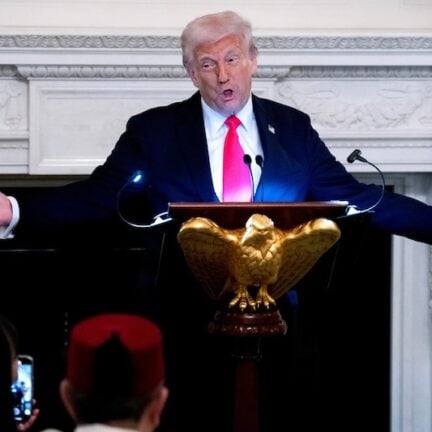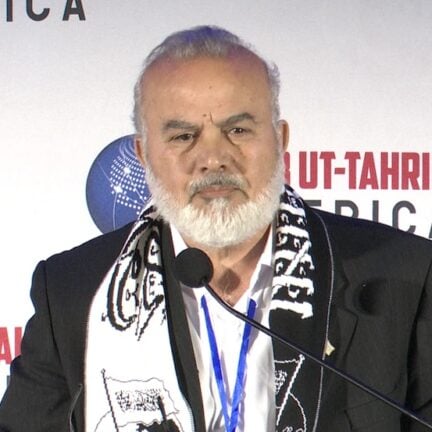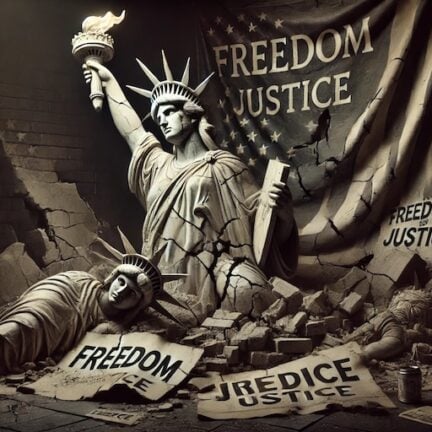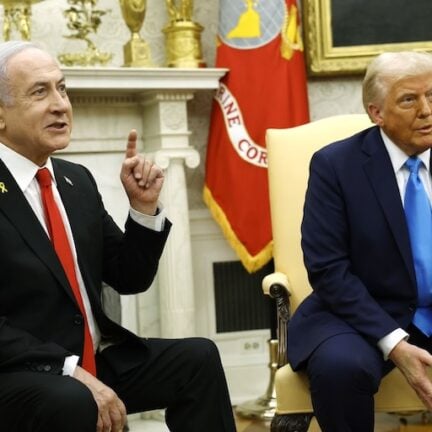What is the Rightous Khilafah
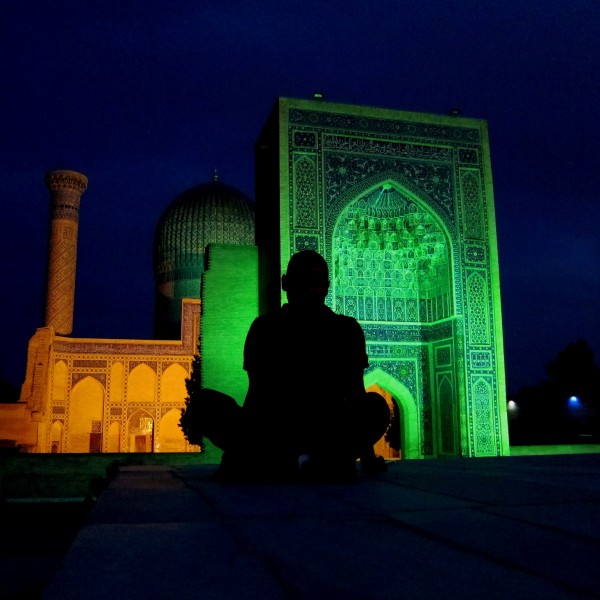
Divine Principles Every Muslim Must Know
Through their disillusionment with colonialist policies and rulers over them, Muslims around the world undoubtedly yearn for the return of Islam as a way of life. The Muslims have made their desire for Islam apparent in their recent demonstrations during the “Arab Spring”, through their increased adherence to Islam. But this sincerity to the adherence of Islam also means that groups and political parties with any semblance of Islam immediately garner the Ummah’s attention and eventual trust. Some even go as far as to claim that they are implementing Islam.
For any government to claim that it is “Islamic”, it must completely and immediately implement Islam. Islam can not be implemented “gradually” as some claim. Others claim that they must implement a so-called “civil state”. The problem is that when these same groups attain power, they still don’t implement Islam. This contraction is apparent to the Ummah, who will eventually lose trust and hope in these parties.
So for any nation to claim that it is Islamic, it must immediately implement Islam and adhere to four principles.
The first principle: Sovereignty is to the Shariah
The supremacy is to the Shariah alone. Every Muslim’s actions are subject to Allah’s commands and prohibitions, from the Khalifah, all the way down to the common citizen. Every action taken by a Muslims must be backed by an evidence from the Islamic Shariah.
“The rule is to none but Allah” TMQ 6:57
“If anyone rules by other than what Allah has revealed, they are kafireen (unbelievers)” TMQ 5:47
“O you who believe! Obey Allah, and obey the messenger and those from you who are in authority; and if you have a dispute concerning any matter, refer it to Allah and the messenger if you believe in Allah and the Last Day. That is better and more seemly in the end.” TMQ 4:59
Referring it to Allah and the Messenger means to the Shari’ah. This clearly indicates that the absolute supremacy is exclusively to the Shari’ah of Allah (swt). This means that no law or system can be referred to or placed as equal to the Islamic Shari’ah. For this reason, any nation that refers to international law, nationalism, capitalism, socialism, etc. would never be considered an Islamic State, no matter how much it refers to Islam.
None of the countries in the Muslim world today have adopted the Islamic Shari’ah as the sole source of legislation. They are rather a patchwork of multiple worldviews (capitalism, socialism) mixed with a strong nationalistic undertone. Even the land of the Haramain (Makkah and Medinah) is not considered an Islamic State, because it recognizes international, unIslamic laws and adopts nationalistic principles, particularly with respect to Saudi’s marrying non-Saudi’s or non-Saudi’s owning property, etc. Thus every other Muslim country violates the sovereignty of the Shariah as well.
The supremacy is to the Shari’ah. The Khalifah is not given the pledge by the Ummah merely to be a hired man, executing what the Ummah decides as is the case in the democratic system. He is given the pledge of allegiance by the Ummah to execute the rules of the Holy Qur’an and the Sunnah of the Messenger (saw), i.e. to execute only Shari’ah laws.
Second Principle: The Authority is to the Ummah
Islam has given the right of appointing the Khalifah to the Ummah. It is the Ummah who chooses the Khalifah and gives him the pledge of allegiance. This is how the rightly guided Khulafaa were appointed. No one is allowed to appoint himself as ruler for the Ummah. The way that the Ummah appoints the Khalifah is through the pledge of allegiance, known as the bayah. There are numerous ahadith about this issue:
Ubada lbnul Samit reported: “We pledged ourselves in complete obedience to the Messenger of Allah in wealth and woe…”
Jarir Ibnu Abdullah reported: “I pledge myself in complete obedience to the Messenger of Allah.”
The Shari’ah only allows the Khalifah to take the authority from the Ummah once she gives him the pledge of allegiance, then the Ummah is obliged to obey him for he is a Khalifah with a pledge (bayah). So the authority is handed over to the Khalifah by the Ummah by giving him a pledge of allegiance, and to obey him. This indicates that the authority is to the Ummah.
If someone acquired their authority without the Ummah’s consent, his authority is not allowed. In the case of the Muslim world today, some of the rulers (or their predecessors) were appointed their power directly by the Western colonialist countries. This happened in the beginning of the last century with the Sykes-Picot Agreement. This is where the British and French divided the Muslim lands (Jordan, Syria, Lebanon, and Iraq) and appointing leaders over the Muslims. The colonialists usurped authority and put established leaders who were subservient to them. This is a clear violation of the verse:
“And never will Allah give a way to the disbelievers over the believers” TMQ 4:141
In fact, the Ummah has the duty to depose the Khalifah if he refuses to implement Islam by abandoning the implementation of salah (prayer) and shows clear and flagrant disbelief. So the Ummah must have the authority to appoint a righteous Khalifah and depose a disobedient one. The current reality shows a situation where the rulers in the Muslim world are hated by their people yet endeared by their Western masters. This also means that the security of the State can not be in the hands of anyone other than the Muslims. Because if a state can not secure its borders, resources, and people, then it does not truly have authority over itself.
Lastly, it is important to mention that even the Messenger of Allah (saw) took the pledge of allegiance from the Muslims after he (saw) became leader and had established the Islamic State in Madinah. It was a pledge of rule and authority, not a pledge of prophecy because many people had already accepted him as a Prophet. He sought people who would pledge to his authority as a ruler.
Third Principle: Appointing One Khalifah is an Obligation on all Muslims.
The Shari’ah has made it an obligation on every Muslim to have a pledge of allegiance (bayah) for a Khalifah; the obligation is to fulfil the pledge. The evidences of this principle is derived from the Sunnah and the general consensus of the sahaba. The Prophet (saw) is reported to have said:
“When the oath of allegiance has been given for two Khalifs, kill the latter of them.” Muslim
“Who so pledges allegiance to an Imam, giving him the clasp of his hand and the fruit of his heart should obey him as long as he can, if another comes to dispute him, you must strike the neck of that man” Muslim
Al Imam Bukhari, Al Imam Ibnu Maja, AI Imam Ahmed and Al Imam Muslim reported on the authority of Abu Hazim who said:
“I accompanied Abu Hurayrah for five years and heard him talking about the Prophet (saw) saying: “the prophets ruled over the children of Israel. Whenever a prophet died, another prophet succeeded him, but there will be no prophet after me; there will be Khulafaa and they will number many” They asked: What then do you command us? He (saw) said: “Fulfil allegiance to them one after the other, give them their dues for verily Allah will make them accountable for what He entrusted them with”. Bukhari, Muslim, and Ibn Maja
These three authentic ahadith clearly indicate that Muslims are forbidden from having more than one Khalifah, or more than one State. Furthermore, the obligation of having a ruler is summarized in the following hadith:
“It is forbidden for three persons to be together in a secluded place without appointing one of them as their Amir” Ahmad
The status of the Muslim Ummah today is that there are multiple leaders in the form of prime ministers, presidents, and kings. The Islamic duty is to have one Amir for all of the Muslims, and should any other arise to challenge him, he must be fought. Ali ibn Abi Talib is reported to have said:
“People must have an Amir, either just, or a tyrant, where the believer works under his Imara, (rule) and under which the unbeliever would also benefit, until his rule ended by the end of his life (ajal), the booty (fay’i) would be gathered, the enemy would be fought, the routes would be made safe, the strong one will return what he took from the weak till the tyrant would be contained, and would not bother anyone”
The Fourth Principle: The Khalifah has the Exclusive Power to Adopt Laws
This principle is derived from the Qur’an, the Sunnah and the general consensus of the Sahabah. At the end of the day, Islam is a deen of order. It obliges Muslims to obey the rules of Allah and His Messenger as well as the legitimate Islamic authority:
“O you who believe! Obey Allah, and obey the Messenger and those of you who are in authority” TMQ 4:59
The Prophet (saw) also said:
“Whoever obeyed me he obeyed Allah; whoever disobeyed me, he disobeyed Allah, whoever obeyed the Amir, he obeyed me, and whoever disobeyed him disobeyed me”
The Shari’ah obliges Muslims to obey the people in authority with the Khalifah as the supreme ruler. His obedience would then be in matters he commands according to Shari’ah. He is not to be obeyed in matters that are sinful, nor in the changing of the divine laws at all.
The head of state is the guardian of the Ummah, and the trustee of her affairs. He is entrusted with protecting and looking after the Muslim’s interests. That is why the Ummah gives him the authority, to rule by what Allah (SWT) has revealed, therefore he works towards enforcing Islam in society and within the state as well as conveying the Islamic Message to the world.
In the wake of Allah’s Messenger’s death, Muslims rushed to appoint a Khalifah to take over the leadership of the Muslims, leaving the matter in the hands of the Ummah to run her affairs by herself. Therefore, the Khilafah is leadership, with the authority to rule over all the Muslim’s affairs and interests. When a person is elected and given the pledge of allegiance to become a Khalifah, the Shari’ah commands him to look after the affairs of the Muslims and the interests of the Ummah.
Conclusion
These are the 4 principles that any state must fulfill if it deems itself “Islamic”. Neglecting any of these issues will make the state unIslamic, no matter how much it tries to claim that it is. The reality in the Muslim world is that not one single country fulfills these criteria. We yearn for the day that a leader will arise to lead the Muslims, pledging to obey nothing but the Shari’ah, seeking the authority from the Muslims, as one Amir for all of the Muslims that settles their disputes and takes care of their affairs.
Divine Principles Every Muslim Must Know
Through their disillusionment with colonialist policies and rulers over them, Muslims around the world undoubtedly yearn for the return of Islam as a way of life. The Muslims have made their desire for Islam apparent in their recent demonstrations during the “Arab Spring”, through their increased adherence to Islam. But this sincerity to the adherence of Islam also means that groups and political parties with any semblance of Islam immediately garner the Ummah’s attention and eventual trust. Some even go as far as to claim that they are implementing Islam.
For any government to claim that it is “Islamic”, it must completely and immediately implement Islam. Islam can not be implemented “gradually” as some claim. Others claim that they must implement a so-called “civil state”. The problem is that when these same groups attain power, they still don’t implement Islam. This contraction is apparent to the Ummah, who will eventually lose trust and hope in these parties.
So for any nation to claim that it is Islamic, it must immediately implement Islam and adhere to four principles.
The first principle: Sovereignty is to the Shariah
The supremacy is to the Shariah alone. Every Muslim’s actions are subject to Allah’s commands and prohibitions, from the Khalifah, all the way down to the common citizen. Every action taken by a Muslims must be backed by an evidence from the Islamic Shariah.
“The rule is to none but Allah” TMQ 6:57
“If anyone rules by other than what Allah has revealed, they are kafireen (unbelievers)” TMQ 5:47
“O you who believe! Obey Allah, and obey the messenger and those from you who are in authority; and if you have a dispute concerning any matter, refer it to Allah and the messenger if you believe in Allah and the Last Day. That is better and more seemly in the end.” TMQ 4:59
Referring it to Allah and the Messenger means to the Shari’ah. This clearly indicates that the absolute supremacy is exclusively to the Shari’ah of Allah (swt). This means that no law or system can be referred to or placed as equal to the Islamic Shari’ah. For this reason, any nation that refers to international law, nationalism, capitalism, socialism, etc. would never be considered an Islamic State, no matter how much it refers to Islam.
None of the countries in the Muslim world today have adopted the Islamic Shari’ah as the sole source of legislation. They are rather a patchwork of multiple worldviews (capitalism, socialism) mixed with a strong nationalistic undertone. Even the land of the Haramain (Makkah and Medinah) is not considered an Islamic State, because it recognizes international, unIslamic laws and adopts nationalistic principles, particularly with respect to Saudi’s marrying non-Saudi’s or non-Saudi’s owning property, etc. Thus every other Muslim country violates the sovereignty of the Shariah as well.
The supremacy is to the Shari’ah. The Khalifah is not given the pledge by the Ummah merely to be a hired man, executing what the Ummah decides as is the case in the democratic system. He is given the pledge of allegiance by the Ummah to execute the rules of the Holy Qur’an and the Sunnah of the Messenger (saw), i.e. to execute only Shari’ah laws.
Second Principle: The Authority is to the Ummah
Islam has given the right of appointing the Khalifah to the Ummah. It is the Ummah who chooses the Khalifah and gives him the pledge of allegiance. This is how the rightly guided Khulafaa were appointed. No one is allowed to appoint himself as ruler for the Ummah. The way that the Ummah appoints the Khalifah is through the pledge of allegiance, known as the bayah. There are numerous ahadith about this issue:
Ubada lbnul Samit reported: “We pledged ourselves in complete obedience to the Messenger of Allah in wealth and woe…”
Jarir Ibnu Abdullah reported: “I pledge myself in complete obedience to the Messenger of Allah.”
The Shari’ah only allows the Khalifah to take the authority from the Ummah once she gives him the pledge of allegiance, then the Ummah is obliged to obey him for he is a Khalifah with a pledge (bayah). So the authority is handed over to the Khalifah by the Ummah by giving him a pledge of allegiance, and to obey him. This indicates that the authority is to the Ummah.
If someone acquired their authority without the Ummah’s consent, his authority is not allowed. In the case of the Muslim world today, some of the rulers (or their predecessors) were appointed their power directly by the Western colonialist countries. This happened in the beginning of the last century with the Sykes-Picot Agreement. This is where the British and French divided the Muslim lands (Jordan, Syria, Lebanon, and Iraq) and appointing leaders over the Muslims. The colonialists usurped authority and put established leaders who were subservient to them. This is a clear violation of the verse:
“And never will Allah give a way to the disbelievers over the believers” TMQ 4:141
In fact, the Ummah has the duty to depose the Khalifah if he refuses to implement Islam by abandoning the implementation of salah (prayer) and shows clear and flagrant disbelief. So the Ummah must have the authority to appoint a righteous Khalifah and depose a disobedient one. The current reality shows a situation where the rulers in the Muslim world are hated by their people yet endeared by their Western masters. This also means that the security of the State can not be in the hands of anyone other than the Muslims. Because if a state can not secure its borders, resources, and people, then it does not truly have authority over itself.
Lastly, it is important to mention that even the Messenger of Allah (saw) took the pledge of allegiance from the Muslims after he (saw) became leader and had established the Islamic State in Madinah. It was a pledge of rule and authority, not a pledge of prophecy because many people had already accepted him as a Prophet. He sought people who would pledge to his authority as a ruler.
Third Principle: Appointing One Khalifah is an Obligation on all Muslims.
The Shari’ah has made it an obligation on every Muslim to have a pledge of allegiance (bayah) for a Khalifah; the obligation is to fulfil the pledge. The evidences of this principle is derived from the Sunnah and the general consensus of the sahaba. The Prophet (saw) is reported to have said:
“When the oath of allegiance has been given for two Khalifs, kill the latter of them.” Muslim
“Who so pledges allegiance to an Imam, giving him the clasp of his hand and the fruit of his heart should obey him as long as he can, if another comes to dispute him, you must strike the neck of that man” Muslim
Al Imam Bukhari, Al Imam Ibnu Maja, AI Imam Ahmed and Al Imam Muslim reported on the authority of Abu Hazim who said:
“I accompanied Abu Hurayrah for five years and heard him talking about the Prophet (saw) saying: “the prophets ruled over the children of Israel. Whenever a prophet died, another prophet succeeded him, but there will be no prophet after me; there will be Khulafaa and they will number many” They asked: What then do you command us? He (saw) said: “Fulfil allegiance to them one after the other, give them their dues for verily Allah will make them accountable for what He entrusted them with”. Bukhari, Muslim, and Ibn Maja
These three authentic ahadith clearly indicate that Muslims are forbidden from having more than one Khalifah, or more than one State. Furthermore, the obligation of having a ruler is summarized in the following hadith:
“It is forbidden for three persons to be together in a secluded place without appointing one of them as their Amir” Ahmad
The status of the Muslim Ummah today is that there are multiple leaders in the form of prime ministers, presidents, and kings. The Islamic duty is to have one Amir for all of the Muslims, and should any other arise to challenge him, he must be fought. Ali ibn Abi Talib is reported to have said:
“People must have an Amir, either just, or a tyrant, where the believer works under his Imara, (rule) and under which the unbeliever would also benefit, until his rule ended by the end of his life (ajal), the booty (fay’i) would be gathered, the enemy would be fought, the routes would be made safe, the strong one will return what he took from the weak till the tyrant would be contained, and would not bother anyone”
The Fourth Principle: The Khalifah has the Exclusive Power to Adopt Laws
This principle is derived from the Qur’an, the Sunnah and the general consensus of the Sahabah. At the end of the day, Islam is a deen of order. It obliges Muslims to obey the rules of Allah and His Messenger as well as the legitimate Islamic authority:
“O you who believe! Obey Allah, and obey the Messenger and those of you who are in authority” TMQ 4:59
The Prophet (saw) also said:
“Whoever obeyed me he obeyed Allah; whoever disobeyed me, he disobeyed Allah, whoever obeyed the Amir, he obeyed me, and whoever disobeyed him disobeyed me”
The Shari’ah obliges Muslims to obey the people in authority with the Khalifah as the supreme ruler. His obedience would then be in matters he commands according to Shari’ah. He is not to be obeyed in matters that are sinful, nor in the changing of the divine laws at all.
The head of state is the guardian of the Ummah, and the trustee of her affairs. He is entrusted with protecting and looking after the Muslim’s interests. That is why the Ummah gives him the authority, to rule by what Allah (SWT) has revealed, therefore he works towards enforcing Islam in society and within the state as well as conveying the Islamic Message to the world.
In the wake of Allah’s Messenger’s death, Muslims rushed to appoint a Khalifah to take over the leadership of the Muslims, leaving the matter in the hands of the Ummah to run her affairs by herself. Therefore, the Khilafah is leadership, with the authority to rule over all the Muslim’s affairs and interests. When a person is elected and given the pledge of allegiance to become a Khalifah, the Shari’ah commands him to look after the affairs of the Muslims and the interests of the Ummah.
Conclusion
These are the 4 principles that any state must fulfill if it deems itself “Islamic”. Neglecting any of these issues will make the state unIslamic, no matter how much it tries to claim that it is. The reality in the Muslim world is that not one single country fulfills these criteria. We yearn for the day that a leader will arise to lead the Muslims, pledging to obey nothing but the Shari’ah, seeking the authority from the Muslims, as one Amir for all of the Muslims that settles their disputes and takes care of their affairs.

